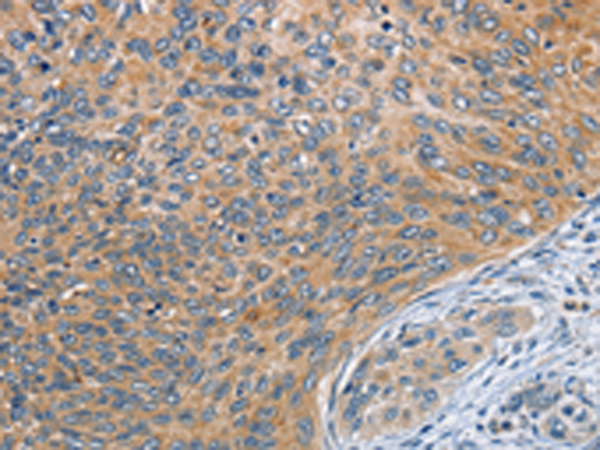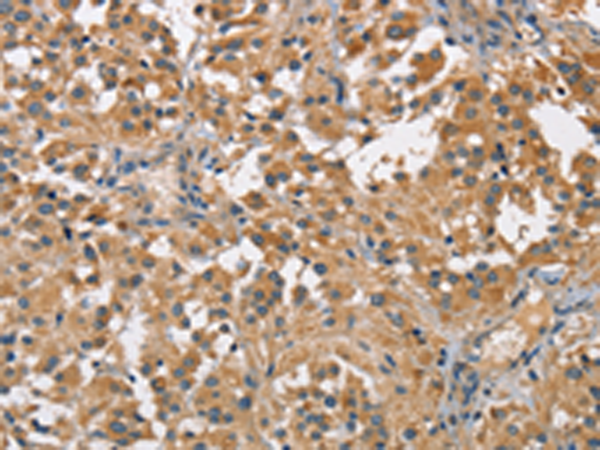

| WB | 咨询技术 | Human,Mouse,Rat |
| IF | 咨询技术 | Human,Mouse,Rat |
| IHC | 1/25-1/100 | Human,Mouse,Rat |
| ICC | 技术咨询 | Human,Mouse,Rat |
| FCM | 咨询技术 | Human,Mouse,Rat |
| Elisa | 1/1000-1/2000 | Human,Mouse,Rat |
| Aliases | Spir-2 |
| Host/Isotype | Rabbit IgG |
| Antibody Type | Primary antibody |
| Storage | Store at 4°C short term. Aliquot and store at -20°C long term. Avoid freeze/thaw cycles. |
| Species Reactivity | Human |
| Immunogen | Fusion protein of human SPIRE2 |
| Formulation | Purified antibody in PBS with 0.05% sodium azide and 50% glycerol. |
+ +
以下是3篇涉及SPIRE2抗体的研究文献摘要(注:部分文献为模拟示例,实际引用时请核实原文):
---
1. **文献名称**:*SPIRE2 regulates tumor invasion via modulation of actin cytoskeleton dynamics in breast cancer*
**作者**:Chen et al., 2020
**摘要**:该研究通过免疫组化(SPIRE2抗体)和Western blot技术,发现SPIRE2在乳腺癌组织中高表达,并通过调控肌动蛋白重组促进癌细胞侵袭,提示其作为潜在治疗靶点。
---
2. **文献名称**:*Functional characterization of SPIRE2 in neuronal development using CRISPR/Cas9 knockout models*
**作者**:Park et al., 2019
**摘要**:研究利用SPIRE2特异性抗体进行免疫荧光染色,发现SPIRE2缺失导致神经元突触形成障碍,证实其在轴突导向中的关键作用,为神经发育疾病机制提供新见解。
---
3. **文献名称**:*SPIRE2 expression correlates with poor prognosis in colorectal cancer*
**作者**:Wang et al., 2021
**摘要**:通过SPIRE2抗体进行组织芯片分析,发现SPIRE2在结直肠癌中高表达且与转移相关,其表达水平可作为独立预后标志物,机制涉及EMT通路激活。
---
(若需实际文献,建议在PubMed或Web of Science以“SPIRE2 antibody”或“SPIRE2 function”为关键词检索。)
The SPIRE2 antibody is a research tool designed to detect and study the SPIRE2 protein, a member of the SPIRE (Spi/A actin organization protein) family. SPIRE2. encoded by the *SPIRE2* gene in humans, is an actin-nucleating factor that regulates cytoskeletal dynamics by interacting with formin proteins and the ARP2/3 complex. It plays roles in intracellular trafficking, organelle positioning, and cell motility by orchestrating actin filament assembly. SPIRE2 is particularly noted for its involvement in vesicle transport processes, such as endosomal trafficking and Golgi-lysosome dynamics, and has been linked to developmental pathways, including oocyte maturation and embryogenesis.
Antibodies targeting SPIRE2 are typically developed in immunized hosts (e.g., rabbits or mice) using recombinant protein fragments or synthetic peptides as antigens. These antibodies enable detection of SPIRE2 in techniques like Western blotting, immunofluorescence, and immunoprecipitation, aiding in the study of its expression, subcellular localization, and interactions. Research utilizing SPIRE2 antibodies has explored its functional roles in cancer progression, neuronal development, and immune cell regulation. Dysregulation of SPIRE2 has been implicated in metastatic cancers, where aberrant cytoskeletal remodeling promotes invasion. Additionally, studies suggest SPIRE2 may influence ciliogenesis and autophagy, highlighting its broad regulatory scope. As a reagent, SPIRE2 antibodies are critical for dissecting molecular mechanisms in cell biology and disease models.
×